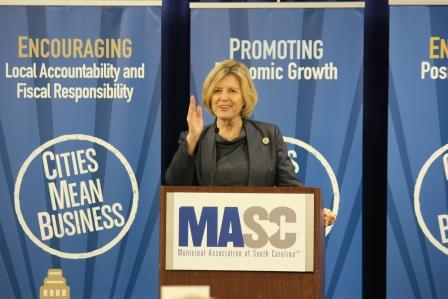A packed room of local officials at the February Hometown Legislative Action Day heard state Superintendent Molly Spearman talk passionately about the state of K-12 education in South Carolina.

South Carolina Superintendent of Education Molly Spearman
speaking at the 2016 Hometown Legislative Action Day
Spearman acknowledged the many local officials in the room who were in the field of K-12 education and kicked off her remarks saying "If you don’t have something good to say about our public schools, you haven’t been in one lately."
Spearman said there is a great deal to brag about in our public schools today. She pointed specifically to the growing career and apprenticeship programs. "Our job is workforce development," she said noting it’s the duty of educators to find a child’s passion and create a pathway for them to get there.
But, she said, "This has to happen everywhere, not just in some districts. Right now, this isn’t happening for every student."
In districts that are right next to one another, one may be world class and the other mediocre. "We’ve got to work on that and think outside the box," Spearman said.
Spearman noted one of the major challenges is how to keep students in school and improve the high school graduation rate. "Let them have fun at school," she said. "Have engaging curriculum. Show them why they are learning about a particular topic. Answer the question of ‘how will I need this in real life’ by teaching them problem solving."
This new way of thinking has to include both educators and parents, she said. "We have to help parents understand the present-day workforce and what it takes to be ready. The old mindset of getting a degree in something and a job will come is not the case anymore. Local elected officials can play a role in this effort by helping students and their parents understand what careers are available in their communities."
One of the proven solutions, she said, is students participating in technical or industrial training programs while still in high school. "This is a place for creating and inventing. We’ve found that students who take four vocational or career classes have a graduation rate of 97 percent."
Another major challenge is making sure every student is ready to learn. "I recognize this is a lofty goal, and educators can’t do it all themselves," Spearman said. "Even if we get students up to speed during the school year, they lose ground during the summer. This just reverses progress and widens the gap."
After-school and summer learning programs are sorely needed to help students stay on track when they aren’t in school. She challenged local officials to ask "what are the children in our town doing during the summer in the city’s parks and recreation programs?"
This is a great opportunity for collaboration between local schools and a city’s city parks and recreation program, she said. Spearman encouraged local officials to focus on strong summer programs to keep students learning so they stay on track when school starts again. One opportunity for collaboration, Spearman noted, is the Summer Food Program that gives local governments the opportunity to partner with the state Department of Education to provide free meals to children in summer programs.
Bottom line, Spearman said, the vision for K-12 education in South Carolina is that every child that gets a diploma is ready for success in whatever they decide to do.
